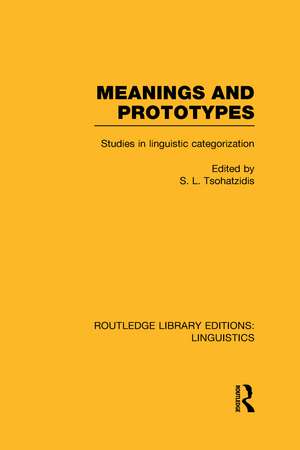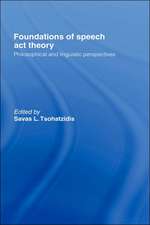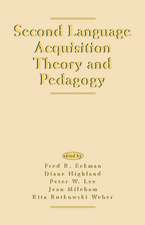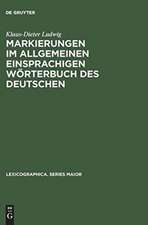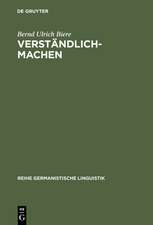Meanings and Prototypes (RLE Linguistics B: Grammar): Studies in Linguistic Categorization: Routledge Library Editions: Linguistics
Editat de S.L. Tsohatzidisen Limba Engleză Hardback – 21 noi 2013
The development of the prototype approach into a satisfactory body of theory obviously requires both that its empirical base be enriched, and that its conceptual foundations be clarified. These are the areas where this volume, in its 26 essays, makes original contributions. The first two parts contain discussions in which various kinds of linguistic phenomena are analysed in ways that make essential use of prototype notions. The last two parts contain discussions in which prototype notions themselves become the object, rather than the instrument, of analytical scrutiny.
| Toate formatele și edițiile | Preț | Express |
|---|---|---|
| Paperback (1) | 436.14 lei 6-8 săpt. | |
| Taylor & Francis – 26 noi 2015 | 436.14 lei 6-8 săpt. | |
| Hardback (1) | 1343.56 lei 6-8 săpt. | |
| Taylor & Francis – 21 noi 2013 | 1343.56 lei 6-8 săpt. |
Din seria Routledge Library Editions: Linguistics
-
 Preț: 340.60 lei
Preț: 340.60 lei - 18%
 Preț: 1000.27 lei
Preț: 1000.27 lei - 18%
 Preț: 1002.63 lei
Preț: 1002.63 lei - 15%
 Preț: 671.56 lei
Preț: 671.56 lei - 18%
 Preț: 1002.63 lei
Preț: 1002.63 lei - 18%
 Preț: 1002.63 lei
Preț: 1002.63 lei - 18%
 Preț: 999.46 lei
Preț: 999.46 lei - 18%
 Preț: 777.70 lei
Preț: 777.70 lei - 34%
 Preț: 4327.12 lei
Preț: 4327.12 lei - 18%
 Preț: 1003.43 lei
Preț: 1003.43 lei - 15%
 Preț: 636.01 lei
Preț: 636.01 lei - 18%
 Preț: 1000.27 lei
Preț: 1000.27 lei - 34%
 Preț: 4048.76 lei
Preț: 4048.76 lei - 18%
 Preț: 1061.06 lei
Preț: 1061.06 lei - 18%
 Preț: 1061.81 lei
Preț: 1061.81 lei - 18%
 Preț: 781.64 lei
Preț: 781.64 lei - 18%
 Preț: 780.87 lei
Preț: 780.87 lei - 18%
 Preț: 891.85 lei
Preț: 891.85 lei - 18%
 Preț: 1001.84 lei
Preț: 1001.84 lei - 18%
 Preț: 1054.71 lei
Preț: 1054.71 lei - 18%
 Preț: 1001.84 lei
Preț: 1001.84 lei - 18%
 Preț: 781.64 lei
Preț: 781.64 lei - 34%
 Preț: 5440.48 lei
Preț: 5440.48 lei - 18%
 Preț: 1002.80 lei
Preț: 1002.80 lei - 15%
 Preț: 670.77 lei
Preț: 670.77 lei - 18%
 Preț: 1001.84 lei
Preț: 1001.84 lei - 34%
 Preț: 2378.63 lei
Preț: 2378.63 lei - 18%
 Preț: 1060.25 lei
Preț: 1060.25 lei - 18%
 Preț: 1005.01 lei
Preț: 1005.01 lei - 18%
 Preț: 1000.27 lei
Preț: 1000.27 lei - 34%
 Preț: 1821.92 lei
Preț: 1821.92 lei - 18%
 Preț: 1002.63 lei
Preț: 1002.63 lei - 18%
 Preț: 1282.82 lei
Preț: 1282.82 lei - 18%
 Preț: 1062.62 lei
Preț: 1062.62 lei - 18%
 Preț: 1059.45 lei
Preț: 1059.45 lei - 18%
 Preț: 780.87 lei
Preț: 780.87 lei - 18%
 Preț: 1058.69 lei
Preț: 1058.69 lei - 18%
 Preț: 1001.07 lei
Preț: 1001.07 lei -
 Preț: 330.87 lei
Preț: 330.87 lei - 18%
 Preț: 1168.37 lei
Preț: 1168.37 lei - 18%
 Preț: 1060.25 lei
Preț: 1060.25 lei - 18%
 Preț: 1000.27 lei
Preț: 1000.27 lei - 18%
 Preț: 999.46 lei
Preț: 999.46 lei - 18%
 Preț: 1285.98 lei
Preț: 1285.98 lei - 15%
 Preț: 671.56 lei
Preț: 671.56 lei - 18%
 Preț: 1956.17 lei
Preț: 1956.17 lei - 34%
 Preț: 1293.09 lei
Preț: 1293.09 lei
Preț: 1343.56 lei
Preț vechi: 1638.48 lei
-18% Nou
Puncte Express: 2015
Preț estimativ în valută:
257.08€ • 269.14$ • 212.72£
257.08€ • 269.14$ • 212.72£
Carte tipărită la comandă
Livrare economică 07-21 aprilie
Preluare comenzi: 021 569.72.76
Specificații
ISBN-13: 9780415723732
ISBN-10: 0415723736
Pagini: 594
Dimensiuni: 156 x 234 x 33 mm
Greutate: 0.93 kg
Ediția:1
Editura: Taylor & Francis
Colecția Routledge
Seria Routledge Library Editions: Linguistics
Locul publicării:Oxford, United Kingdom
ISBN-10: 0415723736
Pagini: 594
Dimensiuni: 156 x 234 x 33 mm
Greutate: 0.93 kg
Ediția:1
Editura: Taylor & Francis
Colecția Routledge
Seria Routledge Library Editions: Linguistics
Locul publicării:Oxford, United Kingdom
Cuprins
Part 1: On the content of prototype categories: questions of word meaning 1. A survey of category types in natural language Cecil H. Brown 2. Possible verbs and the structure of events William Croft 3. Prototypical considerations on modal meanings Steven Cushing 4. Belief ascription, metaphor, and intensional identification Afzal Ballim, Yorick Wilks, John Barnden 5. Negated beliefs and non-monotonic reasoning Ryszard Zuber 6. Lexical hierarchies and Ojibwa noun derivation Richard A. Rhodes 7. Some English terms of insult invoking sex organs: evidence of a pragmatic driver for semantics Keith Allan 8. The lexicographical treatment of prototypical polysemy Dirk Geeraerts Part 2: On the content of prototype categories: further questions 9. Settings, participants, and grammatical relations Ronald W. Langacker 10. On the semantics of compounds and genitives in English Paul Kay and Karl Zimmer 11. A notional approach to the French verbal adjective Roger McLure and Paul Reed 12. Prototypical uses of grammatical resources in the expression of linguistic action René Dirven 13. Toward a theory of syntactic prototypes Margaret E. Winters 14. Accent in prototypical wh questions Dwight Bolinger 15. Prototypical manners of linguistic action Anne-Marie Diller 16. Where partonomies and taxonomies meet Barbara Tversky Part 3: On the context of prototype methods: questions of word meaning 17. ‘Prototypes save’: on the uses and abuses of the notion of ‘prototype’ in linguistics and related fields Anna Wierzbicka 18. Prototype theory and its implications for lexical analysis Adrienne Lehrer 19. Prototype theory and lexical semantics D. A. Cruse 20. Representation, prototypes, and centrality Claude Vandeloise 21. A few untruths about ‘lie’ S.L. Tsolhatzidis Part 4: On the context of prototype methods: further questions 22. On ‘folk’ and ‘scientific’ linguistic beliefs Roy Harris 23. Gestures during discourse: the contextual structuring of thought Nancy L. Dray and David McNeill 24. Why words have to be vague Roger McLure 25. Schemas, prototypes, and models: in search of the unity of the sign John R. Taylor 26. Psycholinguistic semantics, robust vagueness, and the philosophy of language Terence Horgan.
Descriere
There are fewer distinctions in any language than there are distinct things in the universe. If, therefore, languages are ways of representing the universe, a primary function of their elements must be to allow the much more varied kinds of elements out of which the universe is made to be categorized in specific ways. A prototype approach to linguistic categories is a particular way of answering the question of how this categorization operates. It involves two claims. First, that linguistic categorization exploits principles that are not specific to language but characterize most, if not all, processes of cognition. Secondly, that a basic principle by which cognitive and linguistic categories are organized is the prototype principle, which assigns elements to a category not because they exemplify properties that are absolutely required of each one of its members, but because they exhibit, in varying degrees, certain types of similarity with a particular category member which has been established as the best example (or: prototype) of its kind.
